How I Made Partner: Dechert's Angela Liu
"Being a lawyer is not a one-size-fits-all-career, so find something that truly lights you up, and build authentic relationships with those around you."
February 20, 2020 at 02:05 PM
6 minute read
Angela Liu, 37, Dechert
Office: Chicago.
Practice area: Securities litigation.
Law school and year of graduation: University of North Carolina School of Law, 2009.
How long have you been at the firm? Seven years.
How long were you an associate at the firm? Six years.
Were you an associate at another firm before joining your present firm? Yes. I practiced at Katten Muchin Rosenman for a little over a year and left in 2012 to help open up the Chicago office of Dechert.
What year did you make partner at your current firm? 2019
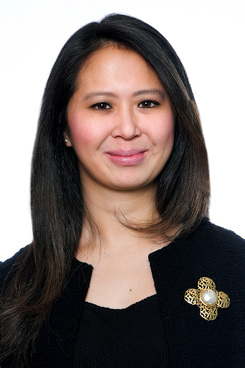 Angela Liu
Angela LiuWhat's the biggest surprise you experienced in becoming partner? Before becoming a partner, I thought I would do much of the same work and be viewed exactly the same as a senior associate because I was the same person. But all of a sudden, when in a different role as partner, you actually become a de facto leader not only in the firm but also in your community. Particularly as one of few Asian American women partners in Big Law, it has been incredibly overwhelming and humbling when strangers have congratulated and even thanked me for becoming a partner. As such, choosing on a daily basis to consciously show up and act as a role model for another generation of associates and other members of the community becomes more important in a way that I had not quite anticipated.
What do you think was the deciding point for the firm in making you partner? At Dechert, when an attorney is considered for partnership, excellence in legal skills and work product is presumed. Each partner, thus, has an additional X factor that becomes a deciding point for the firm. For me, I believe that X factor has been taking rather mundane tasks that others may take for granted and converting them into opportunities—not just for myself but for others around me.
Describe how you feel now about your career now that you've made partner. The day I got the call inviting me to Dechert's partnership, I remember looking outside of my window and being overwhelmed with an overflowing sense of gratitude for every substantive challenge or matter that I had been afforded, every bit of support the partners and talent team have given to me, and more hopeful for a new generation of young lawyers in this country. I am beyond thrilled to be a part of a generation of innovation, disruption and diversity in our profession, and I could not be more excited about our future.
What's the key to successful business development in your opinion? David Kistenbroker, managing partner of the Chicago office and co-chair of our white-collar and securities litigation practice, taught me from the beginning that successful business development begins with being the best lawyer you can be. When I was a junior associate, I remember thinking how difficult it would be to develop business as a first-generation lawyer, child of immigrants, and Asian American female litigator in Chicago from Kansas by way of North Carolina. Turns out, that unique combination of experiences gives me a sense of relatability to clients both here and abroad, and from the C-suite to lower-level employees who end up being star witnesses. I have been successful in giving potential clients a comfort level that, as a diverse attorney, I will be actively participating in their matters. Being able to not only confidently convey my capabilities, while also showing true, active day-to-day involvement on my teams at Dechert has led to successfully pitching clients. I believe that large law firms are really doing a disservice to their bottom line and losing out on opportunities when merely treating diverse attorneys as tokens in pitches or focusing on accolades; they must do the hard work of truly getting to know their diverse attorneys and including them on their matters and on their teams.
What's been the biggest change, day-to-day, in your routine since becoming partner? I thought as an associate I did a lot of non-billable work, such as drafting articles, writing pitch decks, and handling pro bono work. But the biggest change to my day-to-day routine has been tapping into an ownership mindset at Dechert. I've had an uptick in committee, management and administrative hours. I now participate in more meetings, calls, planning, strategy and a lot more mentoring. I also think a lot more about innovative ways to manage and keep my matters on budget.
Who had the greatest influence in your career that helped propel you to partner? Countless influencers have helped propel me to partner. David Kistenbroker and Joni Jacobsen, partners in Dechert's Chicago office, have given me opportunities to develop a passion and expertise in shareholder litigation. Neil Steiner, who was my firm-assigned mentor in Dechert's New York office and with whom I have tried incredibly impactful and public pro bono matters, showed me that practicing law could be fun and innovative, and made me feel included at the firm.
I am also indebted to the network of Dechert's women partners through the Global Women's Initiative's Sponsorship and Sustained Support program, which focuses on assisting female lawyers in navigating the path to partnership. The program provides targeted individual and small-group support, which included training about developing a lawyer's dossier and business plans as well as secrets to rainmaking. We also received individualized attention from Dechert partners.
What's the best piece of advice you could give an associate who wants to make partner? Be genuine. The law firm takes all types, and being a lawyer is not a one-size-fits-all-career, so find something that truly lights you up and build authentic relationships with those around you. Instead of being a mediocre version of someone else, focus on honing your own unique strengths and abilities.
 Have you joined our group ALM Young Professionals Network on LinkedIn? We're having powerful conversations that tackle the challenges we all face early in our careers. Request to join here.
Have you joined our group ALM Young Professionals Network on LinkedIn? We're having powerful conversations that tackle the challenges we all face early in our careers. Request to join here.
This content has been archived. It is available through our partners, LexisNexis® and Bloomberg Law.
To view this content, please continue to their sites.
Not a Lexis Subscriber?
Subscribe Now
Not a Bloomberg Law Subscriber?
Subscribe Now
NOT FOR REPRINT
© 2025 ALM Global, LLC, All Rights Reserved. Request academic re-use from www.copyright.com. All other uses, submit a request to [email protected]. For more information visit Asset & Logo Licensing.
You Might Like
View All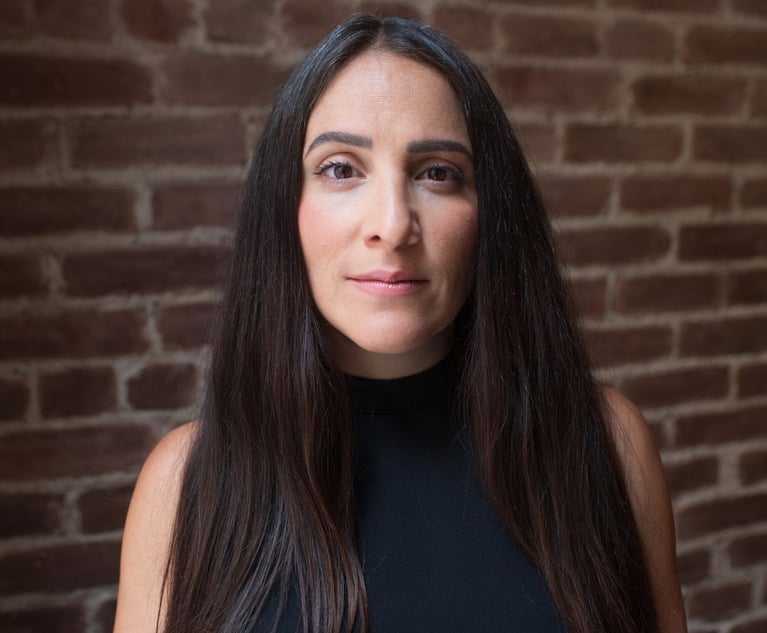
How I Made Practice Group Chair: 'Cultivating a Culture of Mutual Trust Is Essential,' Says Gina Piazza of Tarter Krinsky & Drogin
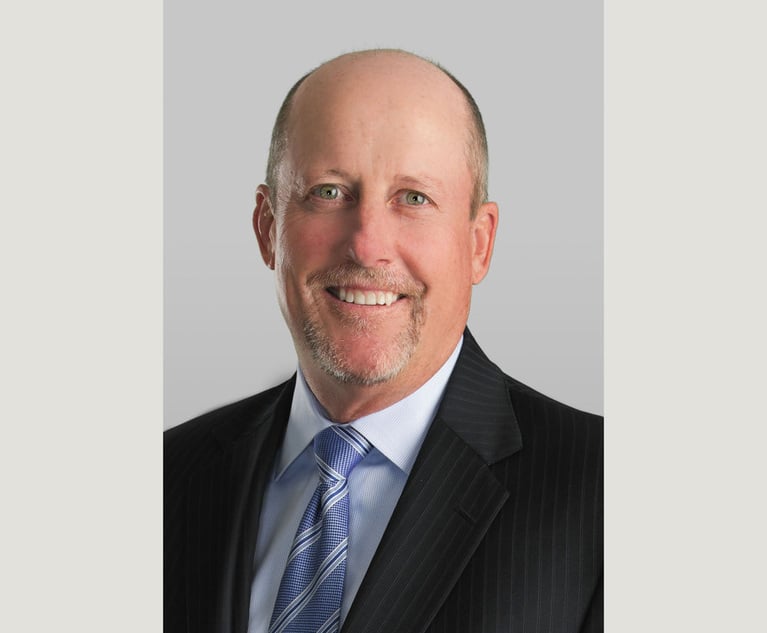
How I Made Managing Partner: 'Be the Uniting Voice of the Firm,' Says George Ogilvie of McDonald Carano
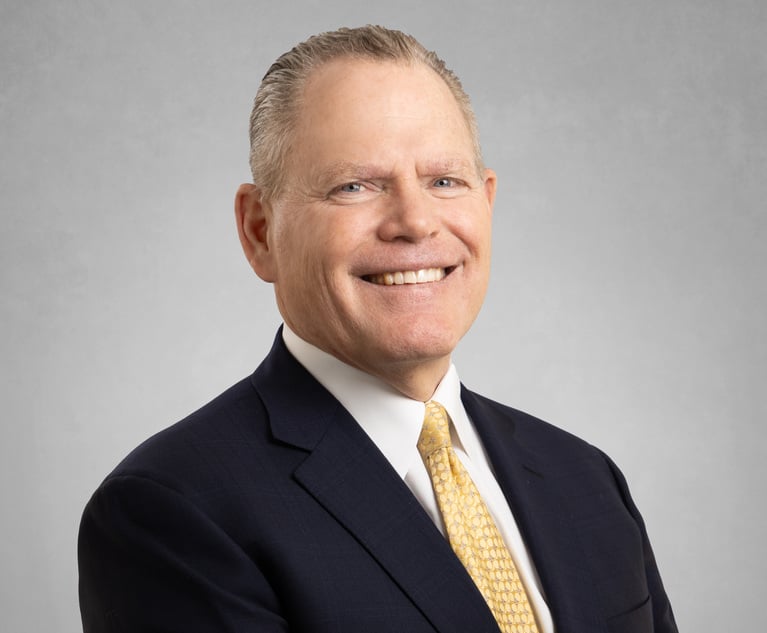
How I Made Managing Partner: 'Educate Yourself About Law Firm Economics,' Says Gregory Hessinger of Mitchell Silberberg
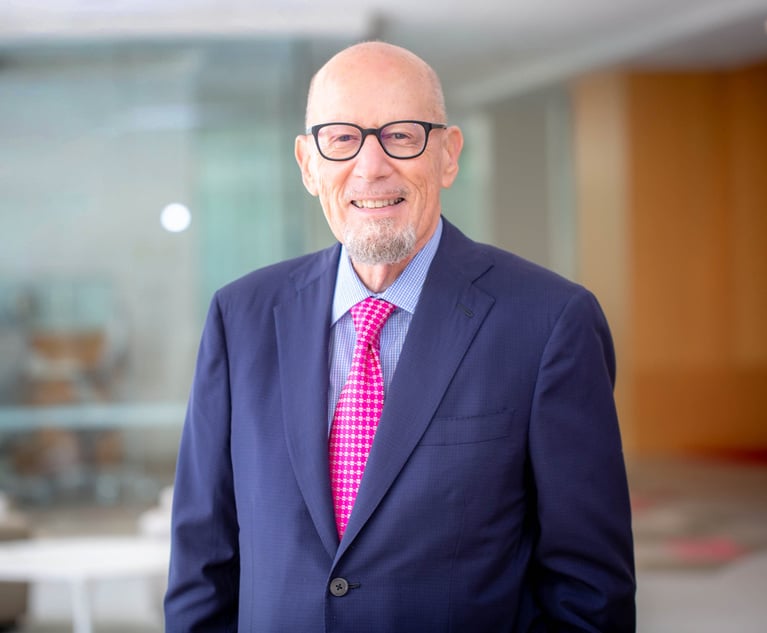
Cozen O'Connor's Bernard Nash Pioneered the Modern State AGs Practice. Now He's Hanging Up His Boots
6 minute readLaw Firms Mentioned
Trending Stories
- 1Big Law Firms Sheppard Mullin, Morgan Lewis and Baker Botts Add Partners in Houston
- 2Lack of Jurisdiction Dooms Child Sex Abuse Claim Against Archdiocese of Philadelphia, says NJ Supreme Court
- 3DC Lawsuits Seek to Prevent Mass Firings and Public Naming of FBI Agents
- 4Growth of California Firms Exceeded Expectations, Survey of Managing Partners Says
- 5Blank Rome Adds Life Sciences Trio From Reed Smith
Who Got The Work
J. Brugh Lower of Gibbons has entered an appearance for industrial equipment supplier Devco Corporation in a pending trademark infringement lawsuit. The suit, accusing the defendant of selling knock-off Graco products, was filed Dec. 18 in New Jersey District Court by Rivkin Radler on behalf of Graco Inc. and Graco Minnesota. The case, assigned to U.S. District Judge Zahid N. Quraishi, is 3:24-cv-11294, Graco Inc. et al v. Devco Corporation.
Who Got The Work
Rebecca Maller-Stein and Kent A. Yalowitz of Arnold & Porter Kaye Scholer have entered their appearances for Hanaco Venture Capital and its executives, Lior Prosor and David Frankel, in a pending securities lawsuit. The action, filed on Dec. 24 in New York Southern District Court by Zell, Aron & Co. on behalf of Goldeneye Advisors, accuses the defendants of negligently and fraudulently managing the plaintiff's $1 million investment. The case, assigned to U.S. District Judge Vernon S. Broderick, is 1:24-cv-09918, Goldeneye Advisors, LLC v. Hanaco Venture Capital, Ltd. et al.
Who Got The Work
Attorneys from A&O Shearman has stepped in as defense counsel for Toronto-Dominion Bank and other defendants in a pending securities class action. The suit, filed Dec. 11 in New York Southern District Court by Bleichmar Fonti & Auld, accuses the defendants of concealing the bank's 'pervasive' deficiencies in regards to its compliance with the Bank Secrecy Act and the quality of its anti-money laundering controls. The case, assigned to U.S. District Judge Arun Subramanian, is 1:24-cv-09445, Gonzalez v. The Toronto-Dominion Bank et al.
Who Got The Work
Crown Castle International, a Pennsylvania company providing shared communications infrastructure, has turned to Luke D. Wolf of Gordon Rees Scully Mansukhani to fend off a pending breach-of-contract lawsuit. The court action, filed Nov. 25 in Michigan Eastern District Court by Hooper Hathaway PC on behalf of The Town Residences LLC, accuses Crown Castle of failing to transfer approximately $30,000 in utility payments from T-Mobile in breach of a roof-top lease and assignment agreement. The case, assigned to U.S. District Judge Susan K. Declercq, is 2:24-cv-13131, The Town Residences LLC v. T-Mobile US, Inc. et al.
Who Got The Work
Wilfred P. Coronato and Daniel M. Schwartz of McCarter & English have stepped in as defense counsel to Electrolux Home Products Inc. in a pending product liability lawsuit. The court action, filed Nov. 26 in New York Eastern District Court by Poulos Lopiccolo PC and Nagel Rice LLP on behalf of David Stern, alleges that the defendant's refrigerators’ drawers and shelving repeatedly break and fall apart within months after purchase. The case, assigned to U.S. District Judge Joan M. Azrack, is 2:24-cv-08204, Stern v. Electrolux Home Products, Inc.
Featured Firms
Law Offices of Gary Martin Hays & Associates, P.C.
(470) 294-1674
Law Offices of Mark E. Salomone
(857) 444-6468
Smith & Hassler
(713) 739-1250









